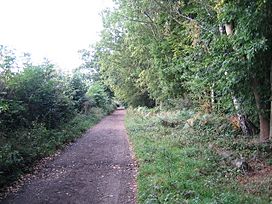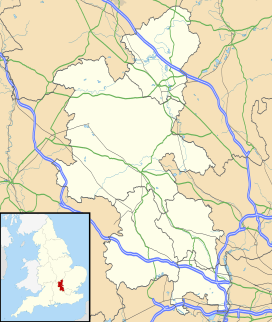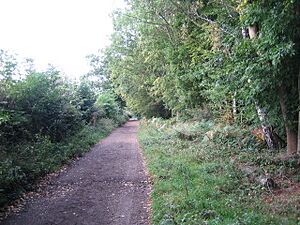Philipshill Wood facts for kids
Quick facts for kids Philipshill Wood |
|
|---|---|

Old Shire Lane, with the wood to the right
|
|
| Map | |
| Geography | |
| Location | Buckinghamshire, England |
| OS grid | TQ010947 |
| Coordinates | 51°38′28″N 0°32′24″W / 51.641°N 0.540°W |
| Area | 77 acres (31 ha) |
| Administration | |
| Governing body | Woodland Trust |
Philipshill Wood is a beautiful forest in England. It covers about 77 acres (31 hectares) and is located in Buckinghamshire, right next to Hertfordshire. This amazing woodland is part of the Chiltern Hills, a special area known for its natural beauty. The Woodland Trust takes care of Philipshill Wood. Everyone is welcome to visit and explore this wonderful place. You can even find some parking on Old Shire Lane, which is on the east side of the wood.
Discovering Philipshill Wood's Past
Philipshill Wood is an ancient woodland. This means it has been a forest for a very long time. Even though it's old, people have cleared and replanted parts of it many times.
Signs of Ancient Life in the Wood
You can find clues about how people used the wood in the past. There are old earthworks, which are changes made to the land. You might also see remains of sawpits, where people cut timber. There are also old chalk pits and places where people made charcoal.
Old Shire Lane and Kingdom Borders
The road on the eastern edge of the wood, Old Shire Lane, is very old. People think it once marked a border. It might have been the boundary between the Anglo-Saxon kingdoms of Wessex and Mercia. Imagine walking on a path that separated ancient kingdoms!
How the Wood Was Used
In the past, the wood provided timber for different uses. Furniture makers in High Wycombe used wood from here. During World War II, the wood was even used to make parts for rifles.
Modern Care for the Wood
Towards the end of the 1960s, the wood was cleared. Then, beech and conifer trees were planted. In 1994, the Woodland Trust took over the ownership and care of Philipshill Wood. They work hard to keep it healthy and beautiful.
Volunteers Helping the Wood
In 2008, a local resident named Janet Anders won an award. The Woodland Trust gave her their "Volunteer of the Year Award." She earned it for organizing weekly volunteer groups. These groups helped take care of the wood.
Plants and Animals of Philipshill Wood
Philipshill Wood is a home for many different plants and animals. It's a great place to see nature up close.
Trees and Plants in the Wood
The wood is mostly filled with beech trees. You can also find several types of conifer trees, like Scots pine, Douglas fir, and western hemlock. These conifers were planted in the 1960s. The Woodland Trust is slowly removing some of them. This is part of their plan to help the wood return to a more natural state. Besides beech and conifers, you'll also see cherry, rowan, hornbeam, field maple, and oak trees.
Beautiful Flowers and Orchids
Philipshill Wood is famous for its amazing bluebells. In April and May, the ground turns into a carpet of purple-blue flowers. It's a truly stunning sight! Other flowers you might spot include wood anemone and wood sorrel. The wood is also home to several kinds of orchids. Look closely, and you might find bird's-nest orchids or white helleborine.
Wildlife in the Forest
If you visit Philipshill Wood, listen carefully. You might hear the calls of tawny owls. These birds live in the wood and are often active at night.
 | Kyle Baker |
 | Joseph Yoakum |
 | Laura Wheeler Waring |
 | Henry Ossawa Tanner |



